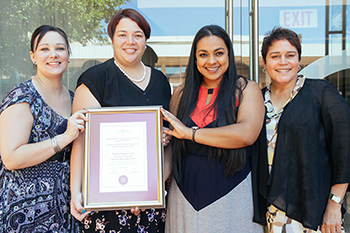Latest News Archive
Please select Category, Year, and then Month to display items
09 December 2020
|
Story Carli Kleynhans
|
Photo Supplied
 Carli Kleynhans.
Carli Kleynhans.
With the most gruelling year recorded in our entire lives, gradually coming to an end we remain hopeful and thankful that we have made it through. From the unexpected shock of going into lockdown, to the worry of having to use a blended approach to succeed in your academics and now finally settling into a new normal, we at the advising office bestow upon you the title of Kovsie champion…because that's exactly what you are!
One of our many champions, Carli Kleynhans, a 3rd (final) year student enrolled for BA Psychology and English shares how she survived…no, actually how she has thrived in 2020.
• What was your biggest concern about your academics when you found out the country was going into lockdown?
My biggest concern about my academics as a final year student was whether the online learning and tests would provide the same in depth learning experiences that are necessary to build upon for future studies.
• What are some of the challenges you've experienced along the way?
Staying focused and trying not to procrastinate was a big challenge I had to conquer, especially trying to not be distracted by my family and my phone. How I survived and was able to thrive in 2020!
• What are some of the strategies you've used to ensure your academics don’t suffer?
Time management was one of the most important strategies that I applied. For most of my classes, I was able to focus each week on a different module, by working and studying in advance I was able to keep up with my workload and still have the weekends to focus on myself, therefore creating designated time to work, study and also time to relax and read.
• What support have you received from the institution that's helped you thus far?
Most of my lecturers have provided needed support regarding our academics. The institution helped provide clarity with everything that was going on.
• What do you think the UFS could have done differently to support student success?
I think the UFS could have provided more resources for the final year students, especially considering we have to apply for further studies; online it was difficult to discern exactly what was necessary for the applications, whereas in class I feel more information would have been provided.
• What has kept you motivated?
Knowing it is my final year has helped to motivate me, as I have to use these grades to apply for further studies. I recently received recognition from Golden Key and this helped to further inspire me to work even harder at my academics.
• What advice do you have for your fellow Kovsies who are finding it difficult to keep going?
Remember to make time for yourself, to look after yourself and your mental health, especially in these difficult times. Work in advance and keep to your personal academic calendar.
Communication Science lecturers walk away with Best Teachers Award
2015-11-26

The winners: Jolandi Bezuidenhout, Rentia Engelbrecht, Jamie-Lee Nortje with Prof Milagros Rivera (Head of Department of Communication Science). |
Jolandi Bezuidenhout, Rentia Engelbrecht, and Jamie-Lee Nortje are the names behind the award-worthy A-Step programme. These lecturers in the Department of Communication Science at the University of the Free State (UFS) have been facilitating extra class for students in the extended programme since 2008. On 12 November 2015, they celebrated a major milestone when the programme received the Excellence in Teaching and Learning Innovation Award.
The annual awards are hosted by Dr Lis Lange Vice-Rector: Academic at the UFS, and administrated through the Centre for Teaching and Learning (CTL).
It was the first time that the Faculty of the Humanities had received the award. The lecturers were named the Best Teachers in the UFS, emerging in first place in the category: Student Engagement and Learning.
The A-Step sessions form part of a governmental programme dedicated to supporting students by offering diverse curriculum-related activities. Students attend two classes per week where they are equipped with language and life skills. As of 2015, the sessions were expanded to benefit not only the extended programme but all 788 students in Introduction to Verbal and Nonverbal Communication (KOM114).
“The activities are based on theoretical work we do in the mainstream classes,” explained Nortje. Primarily, the activities are meant to “help the student engage the work in a meaningful way so that they can understand it,” she said, which is why the sessions are designed in a fun and creative way.
The ‘Best Teachers’ organised and developed the A-Step sessions collectively and diligently over the years. The award, and the improved students’ academic performance, bears testimony to the effectiveness of their teaching style.
Marissa Grobbelaar, the Academic Staff and Development Project coordinator at the CTL, commended the lecturers’ efforts. Grobbelaar believes that “the way they approached their teaching and the passion which was evident in it,” was one of the reasons they deserved the award.
A former A-Step student, Rorisang Sekhasa, attested that, “the programme was very helpful because you get to have one-on-one sessions with your lecturer, and understand the work better. What was done in class is elaborated on in detail.”